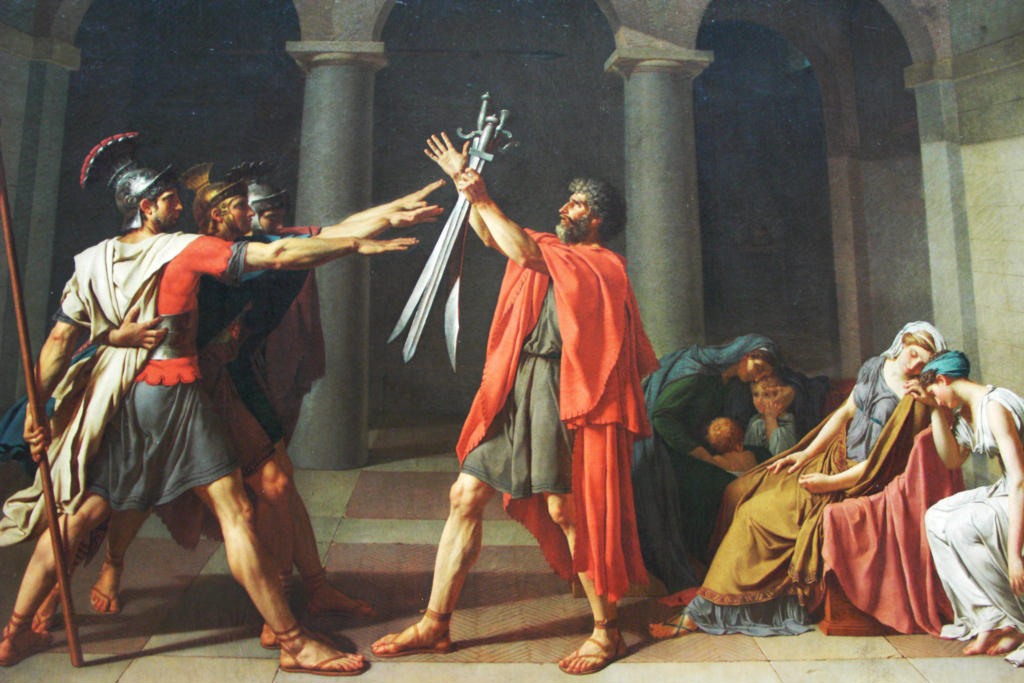[Not completely
edited. Use with caution!]
History 422—Ancient Rome
Introduction
You have all heard the phrase “All roads lead to Rome.”
While this is obviously not true in the physical sense, it is (for the
most part) true for historians.
All roads lead to Rome no matter what period of history one studies.
1. For the ancient historian, Rome is the culmination
of all earlier developments. In my Civ. I classes, I talk again
and again about “the greatest empire the world had yet seen.”
Sargon of Akkad establishes “the greatest empire the world had yet
seen,” Hammurabi establishes “the greatest empire the world had
yet seen,” the Persians establish “the greatest empire the world had
yet seen,” and then “Alexander establishes, “the greatest empire the
world had yet seen.” Rome is the last and greatest of these great
ancient empires, and it included much of the best that earlier empires
had developed.
2. For the medieval historian, all roads lead to
Rome. Bill Bowsky, the medievalist I worked with at Davis, spent
the first couple weeks of his medieval survey on Roman history: with
good reason. The three great powers of the early medieval world
were all direct heirs of Rome (Islam, Byzantium, Western Europe).
Note Note Charlemagne’s empire and the Holy Roman Empire. And
then there’s another great heir of Rome: the papacy. Note Hobbes’
line that the papacy was “none other than the ghost of the Roman empire
sitting crowned on the throne thereof.”
3. For the modern historian, too, the road eventually
leads back to Rome. Modern history begins with the Renaissance,
the rebirth. But the rebirth of what? Note that figures
like Machiavelli, etc. are going back to Roman examples.
All roads lead to Rome no matter what area of history one studies.
1. Political historians again and again turn to Rome
for ideas and inspiration. Look at the great political thinkers through
the modern period (Machiavelli, Rousseau, Voltaire, Jefferson,
Hamilton, Madison, Blanchard, Schaff…) all turn constantly to
Rome. Machiavelli gave us discourses on Livy. Hamilton and
Madison sign their work “Publius.” Echo after echo of Rome.
2. In cultural history too, all roads lead to
Rome. Renaissance art was inspired by Roman art, as was Baroque
art and (obviously) Neoclassical art. David (Oath of
Horatii) Shakespeare (Julius Caesar)—countless others: all inspired by
Roman themes.
Neoclassical art. David (Oath of
Horatii) Shakespeare (Julius Caesar)—countless others: all inspired by
Roman themes.
All roads lead to Rome (or at least most roads) as we study the history
of many, many regions.
1. France, Spain, Italy (Romance languages, Republic,
consuls, Fascism!)
2. Britain (Roman Britain, imperial dreams)
3. Germany (HRE 960-1800!)
4. Russia (Tsars, Moscow the third Rome)
5. Rumania (!)
6. Latin (!) America
7. US history!!! (cf. Publius)
But most important of all, all roads lead to Rome when one wants to
understand the dreams and the ideas of Western civilization. Rome
and Roman ideas dominated the west until very, very recently.
Until the late 19th century, study of the Greek and Latin classics was
at the heart of education everywhere in the West. Until the
unfortunate triumph of Dewey and so-called progressive education 50
years ago, every educated person knew Roman history and literature
thoroughly. One started one’s education in “grammar” school: not
English grammar—Latin grammar!!!
So what I am going to give you in this course is what used to be a
grammar school education!!!!
So why did interest in Rome fade? It shouldn’t have. A
subject that dominated education and inspired so many great thinkers
had to be a fascinating subject—and note that, here at NSU, the great
thinkers still want to study Rome—and with good reason.
Perhaps the most important reason for us to study Roman history is that
the history of Rome is very much like our own history. Like the
U.S., Rome started as a relatively insignificant power, and grew
rapidly into a mighty empire. Again like the U.S., Rome started
as one of the most moral, most idealistic societies of the face of the
earth. Also like the United States, Rome became a vast melting
pot, combining elements from a great variety of cultures. Both in
political and social terms, the developments and problems in ancient
Rome parallel developments and problems in the U.S—in a sometimes
uncanny way.
Note what Livy has to say (read in class). Figuring out what went
right and what went wrong in Roman history, then, is sometimes vitally
important for the light it sheds on our own situation—“The best
medicine for sick minds.”
Think the U.S needs a miracle cure? Well part of that cure is
right here in this class.
 Neoclassical art. David (Oath of
Horatii) Shakespeare (Julius Caesar)—countless others: all inspired by
Roman themes.
Neoclassical art. David (Oath of
Horatii) Shakespeare (Julius Caesar)—countless others: all inspired by
Roman themes.